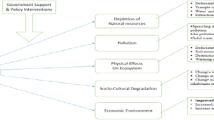Abstract
Tourism includes many elements, but the environmental aspects act as a key factor of tourism. These aspects include Inputs, Processes, Outputs, and Feedback. The Inputs include elements from demand—the tourism potential, motivation, travel opportunities, and destination resources—attractions, services, information, and lodging. The Processes include economic, social, and environmental interactions that can have positive and negative effects. The Feedback allows planning appropriate supervision measures, capacity, policies, and strategies for tourism growth while minimizing negative effects. The tourism system has been defined and modeled via several different perspectives. A functioning tourism system consists of several interrelated components. Demand consists of the tourism market and includes the interest of people to travel and their ability to travel.
Access this chapter
Tax calculation will be finalised at checkout
Purchases are for personal use only
Similar content being viewed by others
References
Adarina, R., Gazukina, Y., & Yankovskaya, K. (2019). Indicators of the “green economy” as a tool for monitoring the regional economy. In IOP Conference Series: Earth and Environmental Science (Vol. 395, p. 012107).https://doi.org/10.1088/1755-1315/395/1/012107
Alekseev, A. N., Savenkov, D. L., Shvakov, E. E., Lebedev, N. A., & Ragulin, A. D. (2018). Financial problems of regional development and the ways of their solution in contemporary Russia. Quality—Access to Success, 19(S2), 71–75.
Avkopashvili, P. T., Polukhin, A. A., Shkodinsky, S. V., & Poltarykhin, A. L. (2019). The fundamental provisions of the concept of knowledge economy. In E. Popkova, Y. Ragulina, & A. Bogoviz (Eds.), Industry 4.0: Industrial revolution of the 21st century (pp. 57–64). Cham, Switzerland: Springer. https://doi.org/10.1007/978-3-319-94310-7_5
Bogoviz, A. V., Shvakov, E. E., Tretyakova, O. G., Zakharov, M. Y., & Abramov, A. N. (2020). Globalization of education in the conditions of formation of the global knowledge economy: Regularities and tendencies. In E. Popkova (Ed.), Growth poles of the global economy: Emergence, changes and future perspectives (pp. 993–1000). Cham, Switzerland: Springer. https://doi.org/10.1007/978-3-030-15160-7_99
Costanza, R. (1996). Ecological economics: Reintegrating the study of humans and nature. Ecol. Applicat, 6(4), 978–990.
Glotko, A. V., Sycheva, I. N., Dunets, A. N., Poltarykhin, A. L., Zhuravlev, P. V., & Tubalets, A. A. (2019). Integration processes in the agro-industrial complex of the regions: Development and environmental problems. Journal of Environmental Management and Tourism, 10(3), 613–621.
Merdesheva, E. V., Titova, O. V., & Avkopashvili, P. T. (2020). Methodological approach to the classification of digital economies by environmental efficiency and sustainability criterion. In E. Popkova, & B. Sergi (Eds.), Scientific and technical revolution: Yesterday, today and tomorrow (pp. 1360–1368). Cham, Switzerland: Springer. https://doi.org/10.1007/978-3-030-47945-9_148
Nekhvyadovich, L., Kostin, K. B., & Mironov, V. V. (2020). Government and public monitoring of entrepreneurship in a multicultural region: New perspectives in the conditions of the digital economy. In E. Popkova, & K. Vodenko (Eds.), Public administration and regional management in Russia (pp. 147–154). Cham, Switzerland: Springer. https://doi.org/10.1007/978-3-030-38497-5_17
Ragulina, Y. V., Semenova, E. I., Avkopashvili, P. T., Dmitrieva, E. A., & Cherepukhin, T. Y. (2019). Top-priority directions of implementing new internet technologies on the territories of rapid economic development. In E. Popkova, & V. Ostrovskaya (Eds.), Perspectives on the use of new information and communication technology (ICT) in the modern economy (pp. 182–188). Cham, Switzerland: Springer. https://doi.org/10.1007/978-3-319-90835-9_21
Stroiteleva, T. G., Kletskova, E. V., & Balaeva, S. I. (2020). Ontogenesis of green development model of digital economy: Essence, stages, and prospects. In E. Popkova, & B. Sergi (Eds.), Scientific and technical revolution: Yesterday, today and tomorrow (pp. 410–417). Cham, Switzerland: Springer. https://doi.org/10.1007/978-3-030-47945-9_46
Stroiteleva, T. G., Petrova, E. A., & Yungblyudt, S. V. (2020). Responsible information society as a social environment for creation of the “green” digital economy: Formation and monitoring. In E. Popkova, & B. Sergi (Eds.), Scientific and technical revolution: Yesterday, today and tomorrow (pp. 402–409). Cham, Switzerland: Springer. DOI: https://doi.org/10.1007/978-3-030-47945-9_45
Tashkulova, G. K., & Kletskova, E. V. (2020a). Place and role of human in the system of circular reproduction in the digital regional economy. In E. Popkova, & B. Sergi (Eds.), Scientific and technical revolution: Yesterday, today and tomorrow (pp. 943–951). Cham, Switzerland: Springer. https://doi.org/10.1007/978-3-030-47945-9_101
Tashkulova, G. K., & Kletskova, E. V. (2020b). The model of organization of “green” digital production and consumption based on the internet of things and AI. In E. Popkova, & B. Sergi (Eds.), Scientific and technical revolution: Yesterday, today and tomorrow (pp. 329–336). Cham, Switzerland: Springer. https://doi.org/10.1007/978-3-030-47945-9_37
Vukovich, G. G., Makuschenko, L. V., Bateykin, D. V., Titova, O. V., & Dobrosotskiy, V. I. (2018). Support of the territories of advanced economic development on human capital: Theory and practice. Quality—Access to Success, 19(S2), 157–160.
Author information
Authors and Affiliations
Editor information
Editors and Affiliations
Rights and permissions
Copyright information
© 2022 The Author(s), under exclusive license to Springer Nature Switzerland AG
About this chapter
Cite this chapter
Nekhvyadovich, L.I., Kuttubaeva, T.A., Petrenko, N.E. (2022). Ecotourism as a Basis for Sustainable Regional Development. In: Popkova, E.G., Sergi, B.S. (eds) Geo-Economy of the Future. Springer, Cham. https://doi.org/10.1007/978-3-030-92303-7_34
Download citation
DOI: https://doi.org/10.1007/978-3-030-92303-7_34
Published:
Publisher Name: Springer, Cham
Print ISBN: 978-3-030-92302-0
Online ISBN: 978-3-030-92303-7
eBook Packages: Earth and Environmental ScienceEarth and Environmental Science (R0)




